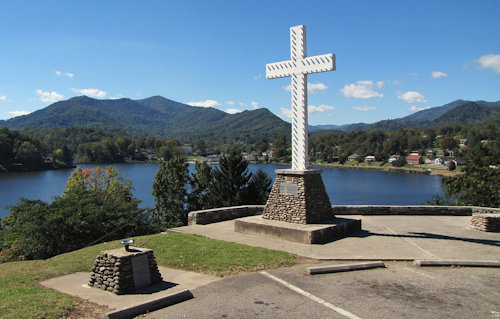The United Methodist Council of Bishops is meeting this week at Lake Junaluska Retreat Center in North Carolina. Guest teacher is the Rev. Dr. Greg Jones.
In a time where everything seems to be moving at a bewildering speed, in ways that cause instability, when “the tectonic plates are shifting in deep and profound ways,”Jones told the Council that it’s important to focus on the power of the end.
“When you stay focused on the end, all kinds of possibilities open themselves. When you focus on the end, it’s not about us, it’s about God,” said Jones, senior strategist for leadership education at Duke Divinity School.
By “the end,” he’s referring to the Reign of God to which we are called to bear witness.
Living in a “multi-nodal” world where the digital revolution is a reality and life grows increasingly more complex, Jones say leaders sometimes get lost because the obstacles seem too great. They stay lost because it’s more comfortable to stay with what’s familiar.
“It’s when we are focused on the end, we discover new ways of engaging the present and the past,” he said.
“If we’re focused on the end, it radically reshapes the present; but it requires a shift from a mindset of despair to a mindset of hope,” he said. “If you’re rooted in hope, then all kinds of possibilities emerge.”
According to Jones, John Wesley was profoundly a person of hope, but he was no optimist. Hope, he said, must be distinguished from optimism.
“Optimism is a trust in who we are to make things better, but if we place our confidence in ourselves, things will fragment and fracture. Hope is a trust in God.”
Jones suggests that ministry focused on the end, and rooted in hope, will have five characteristics that Greg Dees identifies as the heart of social entrepreneurship: First, adopt a mission. Second, align everything you do in service to that mission. Third, be willing to adapt and renovate as you move forward. Fourth, invest resources beyond what you currently have in hand; be bold and take risks. Last, build a heightened sense of accountability towards the outcomes to be achieved.
A view from the balcony
There’s often an expectation of leaders to manage conflict and confusion, but it’s a necessary part of the process to getting to the other side, says Marty Linsky, co-founder of Cambridge Leadership Associates and an expert on adaptive leadership, which their website describes as “a practical leadership framework that helps individuals and organizations adapt and thrive in challenging environments.”
“You can’t make progress without conflict because it’s the process that allows something new to happen,” he said. He likened it to an orchestra leader who creates synthesis out of confusion. Orchestrating, rather than managing or repressing, conflict and confusion should be the goal.
Linsky encouraged the bishops to think of leadership as less about decisions and more about trying to identify, nurture and protect pockets of leadership that “don’t look like you and the things you know how to do well, but help you to make progress in ways that are literally beyond your imagination” – people who push the conventional boundaries.
Linsky said it’s necessary to “get on the balcony” when looking at challenges, in other word, stepping back and observing from a distance in order to get perspective and recognize patterns. Also, recognizing the distinction between exercising leadership and exercising authority is key, as well as recognizing the difference between technical problems and adaptive challenges.
“Difficult problems are difficult because they aren’t susceptible to pain-free solutions,” said Linsky.
Linsky introduced the bishops to a structured five-step peer consulting protocol, a practice that looks at deeper issues and seeks to understand underlying conflicts rather than focusing solely on a technical fix.
The afternoon session provided an opportunity for bishops to consult with their colleagues on leadership challenges they may be facing, using the protocol as a guide.
Mission moments
Worship is a vital aspect of the leadership retreat. As part of each day’s worship service, pastors of area churches are sharing the ways they are connecting with their communities.
During the opening worship on Sunday, the bishops heard from the Rev. Brian Combs of the Haywood Street Congregation in inner city Asheville, N.C., a creative ministry that has taken wings. Started six years ago in a formerly abandoned United Methodist church, they reach out to the homeless and others living on the margins and create an environment where people come together. A weekly home-cooked dinner attracts a diverse group of diners. The church also offers a respite ministry for people who come out of hospitals and have nowhere to go except the streets, so they can have a place to recover after leaving the hospital.
Monday’s mission moment featured St. Paul’s United Methodist Church in Asheville, a church that’s working hard at revitalization. The Rev. Darryl Dayson says his congregation “hit the streets, walking around learning the names of our neighbors,” sharing their joys and troubles and inviting them to connect with God and with one another.”
The church is part of a dynamic partnership they call the Asheville Downtown Cooperative, a group of clergy and parishioners who believe they are better together. They share resources and support one another.
“What has blossomed out of this partnership is a beautiful vision of what God can do in our area,” said Dayson. “We have seen what it looks for us to live out this connection. It takes a long time to turn a big ship, but we know Christ is at the helm of that ship.”
The learning retreat for the residential bishops continues until noon on Thursday, November 5. Ongoing daily reports will share information about the retreat activities and presentations.
Last Updated on November 2, 2023

